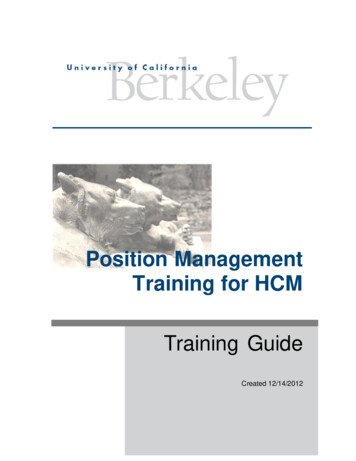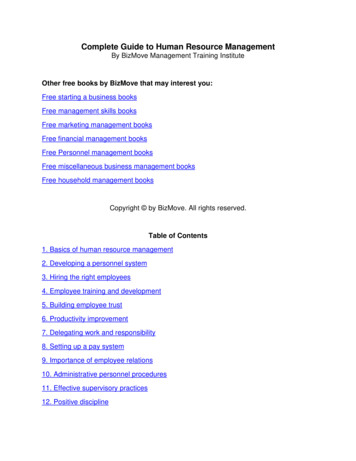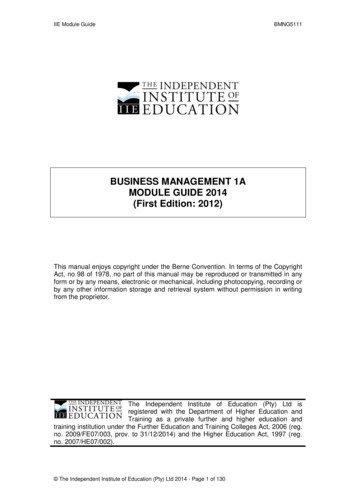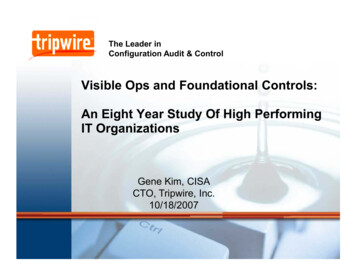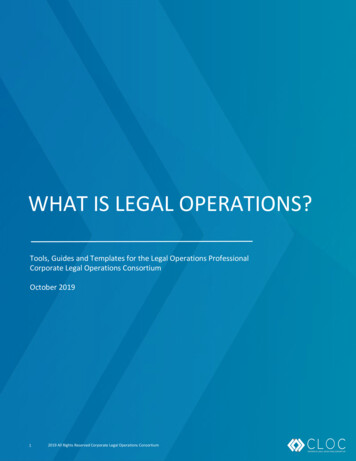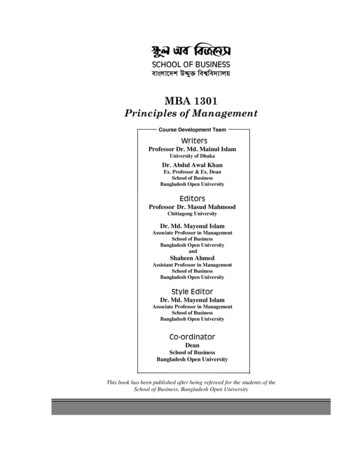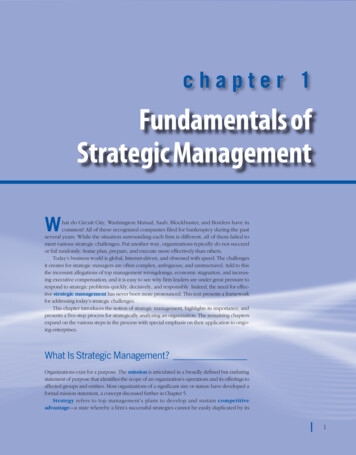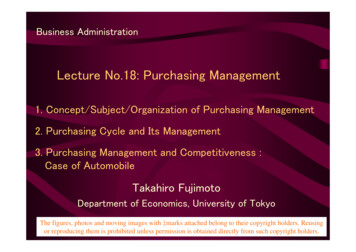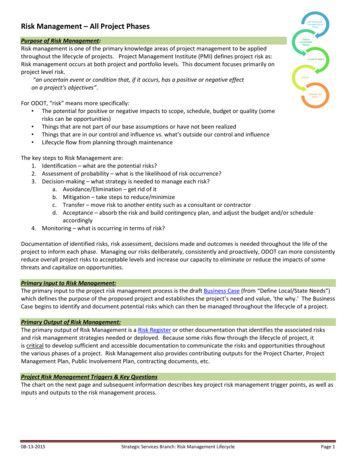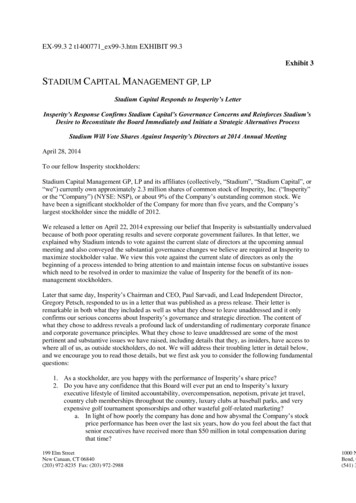
Transcription
EX-99.3 2 t1400771 ex99-3.htm EXHIBIT 99.3Exhibit 3STADIUM CAPITAL MANAGEMENT GP, LPStadium Capital Responds to Insperity’s LetterInsperity’s Response Confirms Stadium Capital’s Governance Concerns and Reinforces Stadium’sDesire to Reconstitute the Board Immediately and Initiate a Strategic Alternatives ProcessStadium Will Vote Shares Against Insperity’s Directors at 2014 Annual MeetingApril 28, 2014To our fellow Insperity stockholders:Stadium Capital Management GP, LP and its affiliates (collectively, “Stadium”, “Stadium Capital”, or“we”) currently own approximately 2.3 million shares of common stock of Insperity, Inc. (“Insperity”or the “Company”) (NYSE: NSP), or about 9% of the Company’s outstanding common stock. Wehave been a significant stockholder of the Company for more than five years, and the Company’slargest stockholder since the middle of 2012.We released a letter on April 22, 2014 expressing our belief that Insperity is substantially undervaluedbecause of both poor operating results and severe corporate government failures. In that letter, weexplained why Stadium intends to vote against the current slate of directors at the upcoming annualmeeting and also conveyed the substantial governance changes we believe are required at Insperity tomaximize stockholder value. We view this vote against the current slate of directors as only thebeginning of a process intended to bring attention to and maintain intense focus on substantive issueswhich need to be resolved in order to maximize the value of Insperity for the benefit of its nonmanagement stockholders.Later that same day, Insperity’s Chairman and CEO, Paul Sarvadi, and Lead Independent Director,Gregory Petsch, responded to us in a letter that was published as a press release. Their letter isremarkable in both what they included as well as what they chose to leave unaddressed and it onlyconfirms our serious concerns about Insperity’s governance and strategic direction. The content ofwhat they chose to address reveals a profound lack of understanding of rudimentary corporate financeand corporate governance principles. What they chose to leave unaddressed are some of the mostpertinent and substantive issues we have raised, including details that they, as insiders, have access towhere all of us, as outside stockholders, do not. We will address their troubling letter in detail below,and we encourage you to read those details, but we first ask you to consider the following fundamentalquestions:1. As a stockholder, are you happy with the performance of Insperity’s share price?2. Do you have any confidence that this Board will ever put an end to Insperity’s luxuryexecutive lifestyle of limited accountability, overcompensation, nepotism, private jet travel,country club memberships throughout the country, luxury clubs at baseball parks, and veryexpensive golf tournament sponsorships and other wasteful golf-related marketing?a. In light of how poorly the company has done and how abysmal the Company’s stockprice performance has been over the last six years, how do you feel about the fact thatsenior executives have received more than 50 million in total compensation duringthat time?199 Elm StreetNew Canaan, CT 06840(203) 972-8235 Fax: (203) 972-29881000 NBend, O(541) 3
STADIUM CAPITAL MANAGEMENT GP, LPb. Does it sit well with you that while the company has massively underperformed itsown plans and its peers, this Board has deemed it fit for management to spend almost 40 million of stockholder money since 2005 on multiple huge private aircraft so thatthese same senior managers can fly them for hundreds of hours a year, again atstockholder expense? And even use these airliner-sized planes on an unlimited basisfor the CEO to commute between multiple residences and the Company’sheadquarters, all at stockholder expense?c. Do you actually believe that this Board and management team will ever address theseissues, in particular when members of management and the Board have multiplefamily members working for the company?3. Does anyone other than purportedly management and the Board have confidence that Insperitywill come anywhere close to achieving its strategic plan outlined to stockholders in 2011?4. After years of poor performance by this management team and Board, and in light of thisBoard’s continuing refusal to realize significant cost savings by eliminating the Company’sculture of excessive “lifestyle” expenses and perquisites, do you believe this Board will evertake the appropriate actions to maximize value for non-management stockholders?We are not happy with the performance of Insperity’s stock priceAlthough stockholders likely need no reminder, below is a chart showing Insperity’s TotalShareholder Returns, including the impact of dividends and share repurchases, versus the Russell 2000and Insperity’s Peer Group Index1. As we stated before, this chart speaks for itself2. As patient, longterm owners, we have specifically chosen long term metrics to evaluate this management team and theBoard. Any notions that our actions are short-term or self-serving at the expense of other stockholdersare of course absurd and inconsistent with the facts. We would imagine that other stockholders wouldalso appreciate an acceleration of pent-up value creation at Insperity.
STADIUM CAPITAL MANAGEMENT GP, LPWe do not have confidence Insperity will come anywhere close to achieving its strategic planWhile the Company’s management and Board seem to believe Insperity is on an acceptable course toachieve its 2011 operating plan, we disagree. In this operating plan, implied EBITDA for 2015, asderived from the Company’s five-year operating income target, is approximately 195- 250 million3.Management’s most recent guidance for 2014 EBITDA is approximately 76.0- 90.5 million4. Wecertainly do not believe management can triple EBITDA between 2014 and 2015, nor do we believeresults over the past several years indicate that management is on a reasonable path to achieve thisgoal even if given more time. In light of these facts, we remain astonished that management and theBoard can apparently remain “optimistic” about their plan.We believe Insperity’s governance is flawed and the Board is neither committed to nor capableof maximizing value for non-management stockholders Insperity does not have “strong” corporate governance. In fact, corporate governance is poor.Messrs. Sarvadi’s and Petsch’s letter offers no defenses for having a staggered board, a combinedCEO and Chairman role or Insperity’s poison pill. Even alone each of these anti-stockholdermeasures significantly reduces the Board’s effectiveness and accountability to non-managementstockholders. The combination is a major concern to us. In Messrs. Sarvadi’s and Petsch’s letter, they try to give the Board credit for “adopting majorityvoting” for directors last year. We find this disingenuous and insulting. The truth is that thismeasure was put to a stockholder vote last year after a stockholder, The California State Teachers’Retirement System (“CalSTRS”), initiated it—not the Board. In fact, the Board explicitlyrecommended that stockholders vote against the measure, as they deemed it “unwarranted andunnecessary” and “not necessary to improve our corporate governance” 5. Only after stockholdersoverwhelmingly disagreed with the Board’s view and approved the measure (77% of all votes castvoted for the measure, and presumably a far higher percentage of non-management, non-directorstockholders), did the Board implement the provision. Messrs. Sarvadi and Petsch provided no explanation for why the Board has not held managementaccountable for failing to achieve meaningful progress against its 2011 operating plan, or why itcontinues to allow excessive management compensation, along with lavish perquisites andbenefits, while management has failed to generate any EBITDA growth in the past six to sevenyears. Neither Messrs. Sarvadi and Petsch nor the head of the Compensation Committee, Eli Jones, hasprovided any explanation for why annual cash bonuses have been so easy to achieve and whystock awards are not subject to performance-based vesting. This is a clear signal to us that theBoard lacks independence from management. Messrs. Sarvadi and Petsch provided no details on how this management team can turn around itsoperating performance or improve its public perception and valuation in the market. Messrs. Sarvadi and Petsch demonstrated a disturbing lack of basic corporate finance knowledgeby suggesting that stockholders and potential investors should use a MarketCap/EBITDAvaluation metric in evaluating the Company compared to its Peer Group. It should concern allstockholders that the Board does not understand the difference between Enterprise Value andEquity Market Capitalization and why EBITDA cannot be used as the denominator for any metricbased upon the latter. The difference, of course, is the existence of net cash or net debt, and thecosts of servicing or benefits received from that capital. As such, using MarketCap/EBITDA issimply financial nonsense. Valuing Insperity based on a P/E multiple is also misleading becauseof the Company’s substantial excess cash. Insperity’s excess cash is not needed to generate netincome and should be subtracted from its Market Cap before calculating any valuation ratios6.
STADIUM CAPITAL MANAGEMENT GP, LP Messrs. Sarvadi and Petsch provided no explanation for why owning two enormous aircraft (37passenger EMB-135s, retrofitted and configured for luxury corporate travel) is in the best interestsof non-management stockholders. They chose to share no data related to the amount ofstockholders’ capital that is used to own the aircraft or any analysis of the costs and benefits oftheir use. Furthermore, no explanation was provided for why it is in the best interests ofstockholders to have the Company’s CEO live in one city and commute to headquarters andcompany facilities in other locations via such a large airplane, regardless of whether it is quasidaily or weekly. For the record, between Dallas (the CEO’s primary residence evidently) andHouston, there are commercial flights essentially every hour all day for less than 250 round trip.The section below contains verbatim excerpts of Insperity’s press release, including Messrs. Sarvadi’sand Petsch’s letter to us. We have included our responses to the issues they raise in bolded italics inthe appropriate sections. “Stadium Capital’s letter and press release are full of inaccuracies and mischaracterizations asdetailed in the Board’s response, including:o Insperity’s reported adjusted EBITDA actually increased 12% from 2011 to 2013 (nota decrease of 6% as reported by Stadium Capital), which is in line with the publiccompetitors cited in Stadium Capital’s letter, and represents a 67% increase since2009.”Insperity’s EBITDA, adjusted for non-recurring items, did in fact decline between2011 and 2013, which is in sharp contrast to its peers. During 2011, managementspecifically highlighted, in press releases, earnings calls and SEC filings, expensesattributable to the Company’s rebranding efforts and non-specific acquisitionexpenses. To state the obvious, it is not every year that a company changes itscorporate identity. In this case, Insperity spent approximately 12 million in 2011 to“rebrand” itself from “Administaff” to “Insperity”. Adding these re-branding andother costs back to EBITDA presents a more accurate picture of the underlyingprofitability from year to year, and is therefore how we have always calculated andanalyzed Insperity’s EBITDA internally at Stadium Capital. Apparently, when itsuited their purposes in 2011, management agreed with us by calling out these itemsas extraordinary expenses. In our original letter to the Board and to stockholders onApril 22nd, we footnoted all adjustments we made to GAAP results.In conversations with the CEO several weeks ago, we specifically discussed how wecalculated this number. The Company’s argument here appears to be that Insperitywould be “growing” if we just believed that the ongoing business was less profitablethan management had led us to believe in the past. We do not find this especiallycomforting.o“Executive compensation is directly impacted by our performance, as reflected in theCEO’s 2013 compensation decline of 12%; and was most recently supported by theleading proxy advisor firms and 92% of the stockholders.”The vote Messrs. Sarvadi and Petsch are referring to was in early 2013, beforemanagement reduced guidance several times throughout the year and issuedSTADIUM CAPITAL MANAGEMENT GP, LP
disappointing guidance for 2014. We admit that we can be faulted in the past forhaving been too patient and accepting of the compensation structure at Insperity inlight of its operating performance.o“The CEO’s total compensation, including commuting and other perquisites, isreasonable. In fact, the proxy report of ISS issued in 2013 placed him near the bottomquarter of peers.”We would challenge anyone who would suggest that commuting between Dallasand Houston via an enormous private aircraft is reasonable. Indeed, we believe thatthe Board’s willingness to allow the CEO free use of a Company-owned, luxuryprivate jet to commute between Dallas and Houston demonstrates, by itself, thegovernance failures at the Company. We simply do not understand how the Boardcan justify these kinds of benefits, particularly in the context of continuallydisappointing operating results over many years.o“Stadium Capital overstated the total executive compensation for all named executiveofficers over the past five years by 14%.”In our letter of April 22nd, we cited executive compensation over six years, not five.We did, however, make a typo in our press release, which should have read sixyears, not five, to match our letter. Our point remains.o“In the letter, Stadium Capital failed to properly consider Insperity’s multi-yearstrategic plan.”We do not understand this point. As other stockholders undoubtedly have, we haveread the Company’s multi-year strategic plan, which we in fact attached to ourrecent SEC filing. In our letter of April 22nd we compared the trajectory implied bythis plan to the Company’s actual results. Is the Company suggesting they are ontrack to achieve this plan? Is there another plan we stockholders don’t know about?In addition, we have also considered Insperity’s other initiatives over the past fewyears (e.g., re-branding, re-pricing, bundling, unbundling, increasing the salesforce, reducing the sales force, retraining the sales force, technology investments,etc.) and all of the corresponding fits and starts. The results that stem from theseplans have taken us to where we are today: the Company continues tounderperform its peers and the market. Based upon the Company’s historicalresults over the past few years we do not have confidence that this managementteam, acting under the supervision of this Board, will achieve the results set forth inthe strategic plan.o“Numerous corporate governance initiatives were implemented over the past twoyears.”We find this argument remarkable. The facts are that Insperity has a staggeredBoard, a combined Chairman and CEO role and a poison pill. As all stockholdersknow, these types of provisions, individually but especially in combination, are largeobstacles to holding board’s accountable and ultimately shareholder value creation.In addition, we view the appointment of Greg PetschSTADIUM CAPITAL MANAGEMENT GP, LP
as Lead Independent Director in 2012 as a half-hearted measure and not a positivedevelopment.Again we note that in their response, Messrs. Sarvadi and Petsch chose to cite“majority voting” as an example of their governance efforts. As we discussed above,the Board’s decision to adopt “majority voting” for directors last year was madeonly after 77% of all votes cast voted for the measure, and presumably a far higherpercentage of non-management, non-director stockholders. Further, in theCompany’s 2013 Proxy Statement, when this provision was to be voted on by theCompany’s stockholders (after CalSTRS submitted the proposal) the Boardexplicitly recommended that stockholders vote against the measure, as they deemedit “unwarranted and unnecessary” and “not necessary to improve our corporategovernance”. In light of the Board’s statements to stockholders about majorityvoting in the Company’s 2013 Proxy Statement, we question how the same Boardcan now claim that it adopted majority voting as a demonstration of its commitmentto good corporate governance.“Stadium Capital Rejected a Reasonable Proposal by Insperity Despite being a stockholder since 2004 (and a major stockholder since 2008) and a longhistory of open dialogue, Stadium Capital first raised these concerns in the past few weeks.”We have had many conversations with management over many years on a variety ofmatters, including those we addressed in our letter. Messrs. Sarvadi and Petsch evenacknowledge such past communications on capital structure in their response. We do notknow why management does not remember these discussions. “During recent discussions, Stadium Capital focused upon the number of seats that it couldobtain on the Board and not on the other issues that were raised in its letter.”In addition to discussing many issues over multiple conversations, we strongly believemultiple new directors are required to effect substantive change. In our view, the seriousissues Insperity faces warrant a significant change on the Board, if meaningfulimprovement is to be achieved. A single director may not be able to drive the level of changewe believe is in the best interests of all shareholders. We expect most stockholders orinvestors will understand why the number of board seats is important in this context. “Despite making allegations of governance failures at Insperity, Stadium Capital demanded tocircumvent important corporate governance policies and procedures designed to protect theinterest of all stockholders.”This is simply not true. At Insperity’s request, representatives of Stadium Capital traveled tovarious locations across the country to meet a number of Insperity’s directors. We did thisat our own expense (and without the use of any private, luxurySTADIUM CAPITAL MANAGEMENT GP, LPaircraft). Stadium Capital’s representatives participated in all of the processes thatInsperity’s Board requested. Nevertheless, despite these efforts Insperity was unwilling tocompromise by offering Stadium Capital meaningful representation on the Board. “Stadium Capital rejected the Board’s offer to add a Stadium Capital employee and anothernew independent director, potentially from another large stockholder, to the Board.”
As we have stated before, given our view of the dysfunction of this Board, one board seat isinsufficient to effect the changes needed to maximize value for all non-managementstockholders. The Board only offered us one seat. The notion of a potential second seat foranother new director was raised, but only as a possible outcome at a later date. We hadmade it completely clear to the Board that in our view two seats is the bare minimumnecessary to create adequate representation for non-management stockholders on theBoard. “Insperity has made 69 million of stock repurchases and paid 103 million in dividends overthe past five years.”It surprises us that Messrs. Sarvadi and Petsch would highlight these points, as it is clearthat these small measures have neither corrected a massively inefficient capital structurenor helped produce acceptable stockholder returns. Insperity held 94 million in excesscash at the end of 2008 and 105 million in excess cash at the end of 20137. “Insperity is focused on and committed to executing its multi-year strategic plan.”We remain astonished that Messrs. Sarvadi and Petsch continue to express this point ofview. As we have shown, management is nowhere close to achieving its publiclyc
We believe Insperity’s governance is flawed and the Board is neither committed to nor capable of maximizing value for non-management stockholders Insperity does not have “strong” corporate governance. In fact, corporate governance is poor. Messrs. Sarvadi’s and Petsch’s letter of


